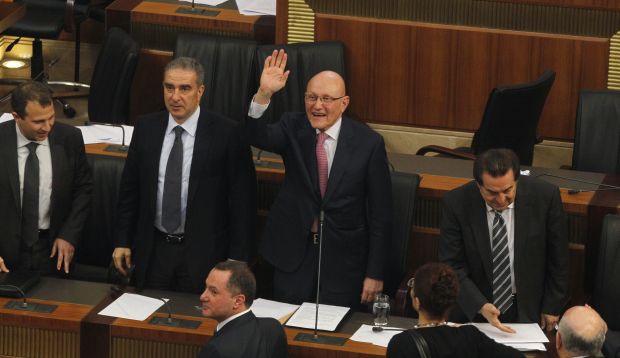
Lebanon’s Prime Minister Tammam Salam gestures after his new government wins a vote of confidence in Beirut March 20, 2014. (Reuters/REUTERS/Sharif Karim)
Beirut, Reuters—Lebanon’s parliament gave a newly-formed cabinet a vote of confidence on Thursday, ending almost a year of political deadlock during which the country has been pulled further into the civil war in neighboring Syria.
The approval—by 96 of the 101 parliamentarians who attended the vote—was widely expected after the government reached a compromise last week on a policy statement following weeks of dispute that brought it to the verge of collapse.
The vote gave Lebanon a fully empowered government for the first time in more than a year, raising hopes of holding presidential elections before President Michel Suleiman’s mandate expires in May and finally conducting parliamentary polls that were postponed last year due to the political impasse.
Until Prime Minister Tammam Salam’s government was formed last month, the country was ruled by a caretaker government following the resignation of his predecessor Najib Mikati.
Mikati resigned in March 2013 as parties aligned with the Shi’ite Hezbollah movement and a Sunni-led rival bloc pursued a power struggle exacerbated by their support for opposing sides in Syria’s three-year-old civil war.
Speaking shortly before the vote, Salam said parliamentarians had highlighted three priorities for Lebanon: “Achieving security, addressing the tragedy of displaced Syrians and holding the presidential election on schedule.”
But he warned against inflated expectations.
“I would like to emphasize in front of you what all Lebanese know. Nothing will be promised that the government cannot achieve, so do not expect miracles.”
The policy statement approved last week fell short of explicitly enshrining Hezbollah’s role in confronting Israel but would give all citizens the right to resist Israeli occupation or attacks.
Israel says it has the right to defend itself against attacks from Lebanon.
The Lebanese statement made the organisation of presidential and parliamentary elections the main priority, while also pledging to take “all possible measures to stimulate key economic sectors, first among them tourism.”
Lebanon, still struggling to recover from its own 1975-1990 civil war, has found its internal rifts aggravated by the conflict in Syria, whose sectarian divisions mirror its own.
Lebanon’s economic growth dropped to about 1.5 percent in 2013 from an average of eight percent a year from 2007 to 2010. Tourism, which directly accounted for more than 10 percent of gross domestic product (GDP) before the current turndown, has fallen off by about 40 percent as deteriorating security has scared off visitors from the Arab Gulf and Europe.
The policy statement also said the government would “accelerate measures related to licensing for oil drilling and extraction.” Potential gas and oil reserves off Lebanon’s Mediterranean coast have raised hopes that Lebanon could in the long term bring down debt which stands at 140 percent of GDP.
But political wrangling has obstructed progress even as neighboring countries stake out their claims. A row over who would control Lebanon’s energy portfolio thwarted an earlier attempt at forming a government.
The new government will also have to cope with the roughly one million Syrian refugees living inside its borders who have strained the already threadbare public infrastructure and threatened to upset its precarious sectarian balance.
